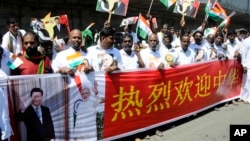ກອງປະຊຸມສຸດຍອດທີ່ບໍ່ເປັນທາງການ ລະຫວ່າງປະທານປະເທດຈີນ ທ່ານສີ ຈິງຜິງ
ແລະນາຍົກລັດຖະມົນຕີອິນເດຍ ທ່ານນາເຣັນດຣາ ໂມດີ ໄດ້ເລີ້ມຂຶ້ນຢ່າງງຽບໆໃນ
ວັນສຸກວານນີ້ ໃນຂະນະທີ່ຜູ້ນຳທັງສອງໄດ້ຈັບມືກັນ ແລະໄດ້ຢ້ຽມຢາມອະນຸສາວາລີ
ເກົ່າແກ່ສາມແຫ່ງ ຢູ່ເມືອງມາມາລລາປູຣຳ ທີ່ເປັນເມືອງແຄມຝັ່ງຢູ່ທາງພາກໃຕ້ຂອງ
ອິນເດຍ.
ແຕ່ພາລະໜ້າທີ່ ໃນການແກ້ໄຂບັນຫາຄວາມເຂັ່ງຕຶງໃໝ່ ໃນຄວາມສຳພັນຂອງປະ
ເທດທັງສອງ ຫຼັງຈາກການຕັດສິນໃຈຂອງອິນເດຍ ທີ່ຍົກເລີກການປົກຄອງຕົນເອງ
ເປັນບາງສ່ວນ ຢູ່ໃນແຄວ້ນແຄັສເມຍທີ່ເປັນບັນຫາໂຕ້ແຍ້ງນັ້ນ ອາດຈະບໍ່ເປັນທີ່ງ່າຍ
ດາຍ ເວລາຜູ້ນຳທັງສອງຈັດການສົນທະນາທີ່ສຳຄັນໃນວັນເສົາມື້ນີ້.
ທ່ານສີ ໄດ້ເດີນທາງໄປເຖິງ ໃນການຕ້ອນຮັບດ້ວຍການຟ້ອນລຳພື້ນເມືອງຂອງ ອິນ
ເດຍ ສອງມື້ຫຼັງຈາກທ່ານກ່າວວ່າ ທ່ານໄດ້ຈັບຕາເບິ່ງຢ່າງໃກ້ຊິດເຖິງສະຖານະການ
ຢູ່ໃນແຄວ້ນແຄັສເມຍ ແລະທ່ານໄດ້ເນັ້ນຢ້ຳຢ່າງໜັກແໜ້ນເຖິງການສະໜັບສະໜຸນ
ທາງດ້ານການທູດ ຕໍ່ປາກິສຖານ ຊຶ່ງເປັນຄູ່ແຂ່ງຂອງອິນເດຍ ໂດຍໄດ້ຄັດຄ້ານຕໍ່ການ
ປະຕິບັດຂອງນິວເດລີ ຢູ່ໃນແຄວ້ນແຄັສເມຍ. ລັດຖະມົນຕີຕ່າງປະເທດອິນເດຍ ໄດ້
ຕອບໂຕ້ຄືນໂດຍກ່າວວ່າ ມັນ “ບໍ່ແມ່ນສຳລັບປະເທດຕ່າງໆທີ່ຈະໃຫ້ຄວາມເຫັນ
ກ່ຽວກັບກິດຈະການພາຍໃນຂອງອິນເດຍ.”
ພວກເຈົ້າໜ້າທີ່ຍັງບໍ່ທັນໄດ້ຢືນຢັນວ່າ ບັນຫາສ້ຽນໜາມຂອງແຄັສເມຍ ຊຶ່ງເປັນຂົງ
ເຂດທີ່ຕັ້ງຢູ່ເທິງພູຫິມະໄລ ທີ່ທັງອິນເດຍ ແລະປາກິສຖານຕ່າງກໍອ້າງເອົາກຳມະສິດ
ນັ້ນ ຈະຖືກຈັດເຂົ້າໃນຫົວຂໍ້ຂອງການສົນທະນາຫຼືບໍ່.
ພວກເຈົ້າໜ້າທີ່ອິນເດຍໄດ້ກ່າວວ່າ ຖ້າຫາກມີ ເຖິງຢ່າງໃດກໍດີ ທ່ານໂມດີ ຄາດວ່າ
ຈະຮຽກຮ້ອງໃຫ້ທ່ານສີ “ມີຄວາມລະມັດລະວັງ” ໃນຄວາມເປັນຫ່ວງກ່ຽວກັບອິນເດຍ
ແລະອະທິບາຍວ່າ ເປັນຫຍັງລັດຖະບານຂອງທ່ານ ໄດ້ຕັດສິນໃຈຍົກເລີກການປົກ
ຄອງຕົນເອງ ຂອງແຄວ້ນແຄັສເມຍ.
ຫຼາຍຊົ່ວໂມງກ່ອນທ່ານສີ ເດີນທາງໄປເຖິງອິນເດຍ ຕຳຫຼວດໄດ້ກັກຂັງພວກນັກເຄື່ອນ
ໄຫວທິເບດສິບກວ່າຄົນ ທີ່ວາງແຜນຈະປະທ້ວງການຢ້ຽມຢາມຂອງຜູ້ນຳຈີນ. ພວກທີ່
ຖືກກັກຂັງແມ່ນຮວມທັງຜູ້ນຳສະພາຊາວໜຸ່ມທິເບດ ທ້າວກົງໂພ ດອນດັບ ຜູ້ທີ່ຮ້ອງ
ອອກມາວ່າ “ພວກເຮົາຕ້ອງການອິດສະຫລະພາບ” ໃນຂະນະທີ່ລາວໄດ້ຖືກນຳໂຕໄປ.
ນິວເດລີ ຊຶ່ງເປັນບ່ອນຢູ່ຂອງຜູ້ນຳທາງດ້ານຈິດໃຈຂອງຊາວທິເບດ ອົງດາໄລ ລາມະ
ແລະລັດຖະບານທິເບດພັດຖິ່ນ ໄດ້ຖືກພົບເຫັນຢູ່ເລື້ອຍໆໃນຄວາມພະຍາຍາມໂດຍ
ພວກນັກເຄື່ອນໄຫວທິເບດ ເພື່ອຈັດການປະທ້ວງລະຫວ່າງການຢ້ຽມຢາມພວກ
ເຈົ້າໜ້າທີ່ຈີນ.
ພວກເຈົ້າໜ້າທີ່ອິນເດຍກ່າວວ່າ ການເພີ້ມການຮັກສາຄວາມປອດໄພຢູ່ຕາມຊາຍ
ແດນທີ່ຍາວເກືອບ 3,500 ກິໂລແມັດ ເທິງພູຫິມະໄລນັ້ນຄາດວ່າ ຈະເປັນຈຸດເພັ່ງ
ເລັງທີ່ສຳຄັນໃນການເຈລະຈາດັ່ງກ່າວ.
An informal summit between Chinese President Xi Jingping and Indian Prime Minister Narendra Modi got off to a quiet start Friday as the two leaders shook hands and visited three ancient monuments in Mamallapuram, a coastal town in southern India.
But the task of addressing fresh strains in their ties in the wake of India's decision to cancel partial autonomy in the disputed Kashmir region may not be easy when the two leaders hold more substantive talks on Saturday.
Xi arrived to a welcome of traditional dances in India two days after saying he was closely watching the situation in Kashmir, and he reiterated strong diplomatic backing for India's archrival, Pakistan, which has opposed New Delhi's actions in Kashmir. India's foreign ministry retaliated by saying it was "not for other countries to comment on the internal affairs of India."
Officials have not confirmed whether the thorny issue of Kashmir, the Himalayan region that both India and Pakistan claim, will figure in the talks.
If it does, though, Modi is expected to urge Xi to be more "sensitive" to India's concerns and to explain why his government decided to revoke Kashmir's autonomy, Indian officials have said.
Hours before Xi landed in India, police detained about a dozen Tibetan activists planning to protest the Chinese leader's visit. Those held in custody include the leader of the Tibetan Youth Congress, Gonpo Dhondup, who shouted, "We want freedom" as he was hustled away.
New Delhi, which is home to Tibetan spiritual leader, the Dalai Lama and the Tibetan government in exile, has routinely foiled efforts by Tibetan activists to stage protests during the visit of Chinese dignitaries.
Indian officials say bolstering border security along their nearly 3,500-long kilometer border in the high Himalayas is expected to be a key focus of the talks.





